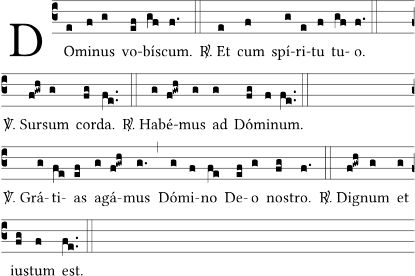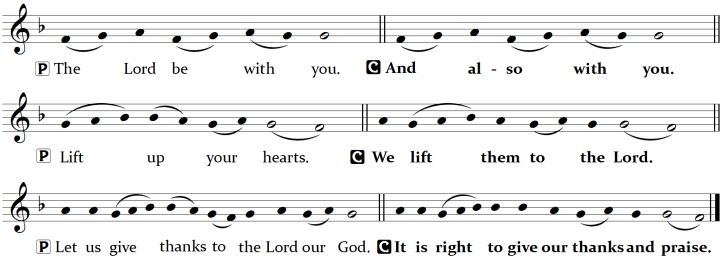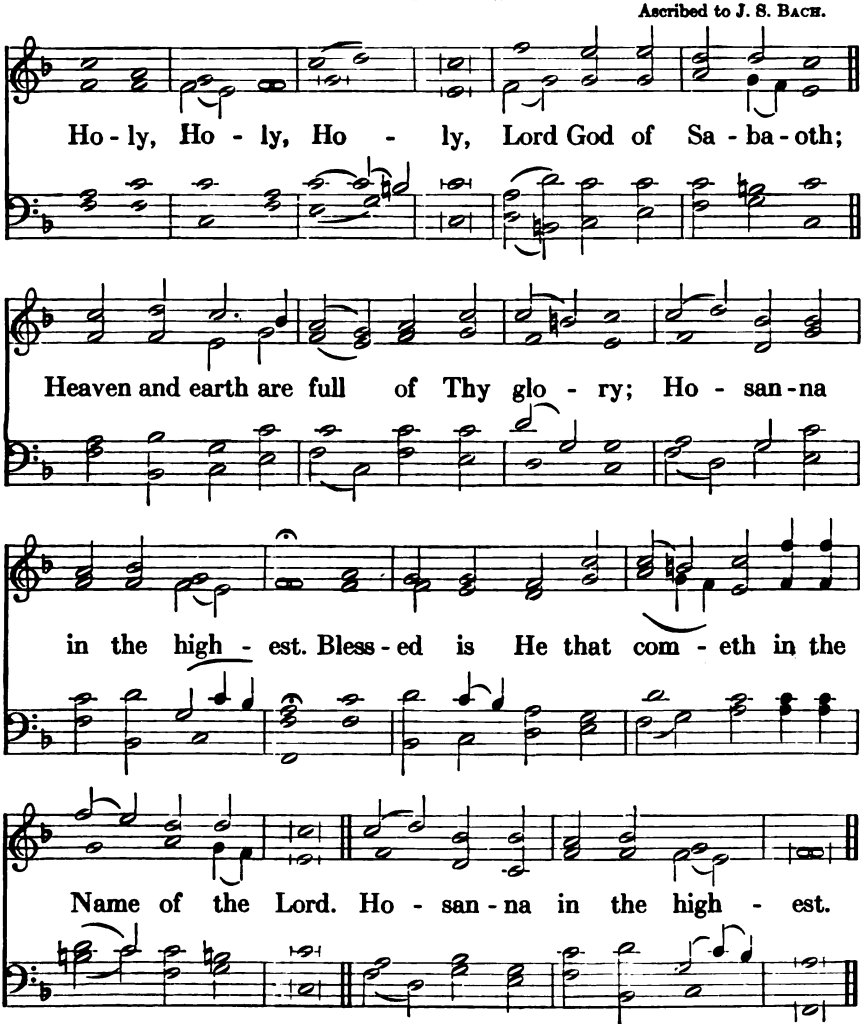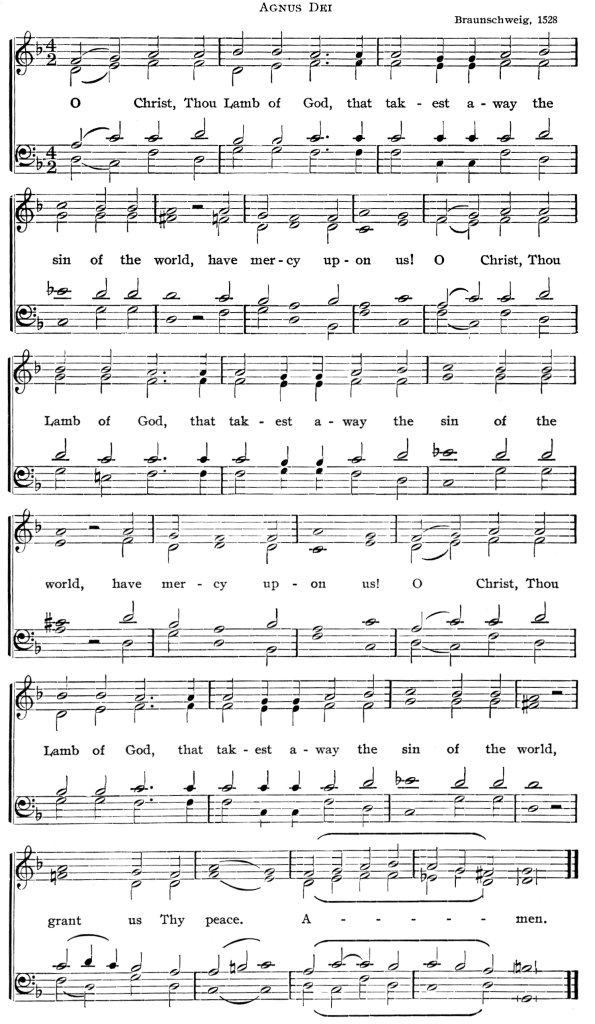The Service of the Sacrament begins with the Great Thanksgiving, a prayer that leads up to the Words of Institution, and in some cases includes the Words of Institution.
The Great Thanksgiving begins with the same greeting as the Service of the Word. “The Lord be with you. And also with you.” Only here there is a full dialogue that follows as we begin “The Great Thanksgiving.” Some early liturgies have the Apostolic Greeting at the beginning of the Great Thanksgiving / Preface Dialogue instead of the Salutation and Response.
The Great Thanksgiving
The Lord be with you.
And also with you.
Lift up your hearts.
We lift them to the Lord.
Let us give thanks to the Lord our God.
It is right to give him thanks and praise.
Below the preface dialogue is displayed in Latin with ancient notation, also in English with modern notation:


The preface dialogue is often called the Sursum Corda, the Latin for “Lift up your hearts.”
This dialogue between the president and the congregation is found as early as the third century in the West (Hippolytus, ca. 215, and Cyprian, ca. 252) and the fourth century in the East (Cyril of Jerusalem, ca. 350). Its universality shows that it developed from a dialogue at Jewish ritual meals where the grace or thanksgiving after the main meal was introduced by the president’s saying “Let us give thanks to the Lord our God” and the gathered company giving their assent. In the Eucharist the dialogue leads into the great thanksgiving, which traditionally begins with a preface culminating in the Sanctus. (From the commentary on www.englishtexts.org) The tune presented here may be just as old–older than the notation that preserves it!
“Lift up your hearts” may be derived from Colossians 3:1, “Since, then, you have been raised with Christ, set your hearts on things above, where Christ is, seated at the right hand of God.” It also reminds me of the psalmist’s expression of trust in Psalm 25:1, “To you, O Lord, I will lift up my soul.” Originally, it may have been an invitation to stand (Strey, Christian Worship, p. 131). There are other services where a dialogue precedes a prayer of thanksgiving (some versions of Evening Prayer in the thanksgiving for light, and Baptism liturgies), but “Lift up your hearts. We lift them to the Lord.” is used exclusively in the dialogue before Holy Communion.
“Let us give thanks to the Lord our God. It is right to give him thanks and praise.” The response in Latin is simply “Dignum et justum est.” “It is right and just.” Like the Salutation, this also seems to be a “little ordination,” where the assembly tells the officiant, “Yes, let’s give thanks!”
The Proper Preface
The proper preface is a seasonal sentence that reflects on God’s work among his people, and emphasizes the reason we are giving thanks in Advent, Christmas, Epiphany, Lent, etc. The sentence at the end is a segue to the Sanctus that emphasizes that we are not alone in our praise. We join with saints of all time and the angels of heaven, singing the song Isaiah heard in chapter 6 and John heard in Revelation 4:8. Proper prefaces below are from Common Service Book (1917) with the exception of Advent, which is from The Lutheran Hymnal (1941).
It is truly meet, right, and salutary, that we should at all times and in all places give thanks to you, O Lord, holy Father, almighty everlasting God, through Jesus Christ our Lord,…
For Advent: …whose way John the Baptist prepared, proclaiming him the Messiah, the very Lamb of God, and calling sinners to repentance that they might escape from the wrath to be revealed when he comes again in glory. Therefore with angels…, etc.
For Christmas: …for in the mystery of the Word made flesh, you have given us a new revelation of your glory; that seeing you in the person of your Son, we may be drawn to the love of those things which are not seen. Therefore with angels…, etc.
For Epiphany: …and now do we praise you, that you sent us your only Son, and that in him, being found in fashion as a man, you revealed the fullness of your glory. Therefore with angels…, etc.
For Lent: …who on the tree of the cross did give salvation to mankind; that where death arose, there life also might rise again: and that he who by a tree once overcame, might likewise by a tree be overcome, through Christ our Lord; through whom with angels…, etc.
For Easter: …but chiefly are we bound to praise you for the glorious Resurrection of your Son, Jesus Christ, our Lord: for he is the very Paschal Lamb, who was offered for us, and has taken away the sin of the world; by his death has destroyed death, and by his rising to life again, has restored to us eternal life. Therefore with angels…, etc.
For the Festival of the Ascension: …who, after his Resurrection, appeared openly to all his disciples, and in their sight was taken up into heaven, that he might make us partakers of his divine nature. Therefore with angels…, etc.
For the Festival of Pentecost: …who ascending above the heavens and sitting at your right hand, poured out [on this day] the Holy Spirit on the chosen disciples as he had promised, for this the whole earth rejoices with exceeding joy. Therefore with angels…, etc.
For the Festival of the Holy Trinity: …with you and the Holy Spirit, are one God, one Lord. And in the confession of the only true God, we worship the Trinity in Person, and the Unity in Substance, of majesty co-equal. Therefore with angels…, etc.
… Therefore with angels and archangels, and with all the company of heaven, we laud and magnify your glorious name; evermore praising you, and saying:
Holy, Holy, Holy – Sanctus
Holy, holy, holy Lord, God of power and might,
heaven and earth are full of your glory.
Hosanna in the highest.
Blessed is he who comes in the name of the Lord.
Hosanna in the highest.


The Sanctus is part of the Great Thanksgiving, a part sung by choir or congregation. The song itself is derived from Isaiah 6 and Revelation 4, and it’s use in a prayer before Holy Communion has some doctrinal implications. Isaiah and John were in the presence of God when they heard the hosts of heaven sing, “Holy, holy, holy.” In Holy Communion, Jesus Christ comes to us. He is the one “who comes in the name of the Lord.” He is truly present with us, according to the promise embedded into his commands, “Take and eat; this is my + body, which is given for you. / , “Drink from it, all of you; this is my + blood of the new covenant, which is poured out for you for the forgiveness of sins. Do this in remembrance of me.”
The Eucharistic Prayer / Prayer of Thanksgiving follows.
Prayer of Thanksgiving
We give you thanks, O God,
through your beloved servant, Jesus Christ,
whom you have sent in these last times
as Savior and Redeemer and messenger of your will.
He is your Word, inseparable from you,
through whom you made all things
and in whom you take delight.
You sent him from heaven into the virgin’s womb,
where he was conceived and took flesh.
Born of the virgin by the power of the Holy Spirit,
he was revealed as your Son.
In fulfillment of your will he stretched out his hands in suffering
to release from suffering those who place their trust in you,
and so won for you a holy people.
He freely accepted the death to which he was handed over
in order to destroy death and to shatter the chains of the evil one;
to trample underfoot the powers of hell
and to lead the righteous into light;
to fix the boundaries of death
and to manifest the resurrection.
Remembering therefore his death and resurrection,
we set before you this bread and cup,
thankful that you have counted us as your priestly people.
We ask you to send your Holy Spirit
upon the offering of the holy church.
Gather into one all who share these holy mysteries,
filling them with the Holy Spirit and confirming their faith in the truth,
that together we may praise you and give you glory,
through your servant, Jesus Christ.
Amen.
Source: Adapted from the Anaphora of Hippolytus, A. D. 215, from The Worship Sourcebook, © 2004, Faith Alive Christian Resources.
The Anaphora of Hippolytus is the basis for Eucharistic Prayer II in the Roman Rite, Eucharistic Prayer IV in Lutheran Book of Worship, Eucharistic Prayer XI in Evangelical Lutheran Worship, in the Holy Eucharist in Rite Two in The Book of Common Prayer (1979), and in Setting One in Christian Worship: Hymnal (2021).
When Martin Luther was assembling his Formula Missae, his Latin order of service, he removed the Prayer of Thanksgiving, also called the Canon, because the prayer in common use at his time had numerous references to the Mass as a sacrifice. (The Tridentine Canon, and the present Canon of the Mass also refers to the Mass as Sacrifice.) Beginning with Service Book and Hymnal (1958) Lutherans have been reintroducing Prayers of Thanksgiving, often using historic models as their basis.
Lord’s Prayer
Our Father in heaven,
hallowed be your name,
your kingdom come,
your will be done
on earth as in heaven.
Give us today our daily bread.
Forgive us our sins,
as we forgive those
who sin against us.
Lead us not into temptation,
but deliver us from evil.
For the kingdom, the power,
and the glory are yours
now and forever. Amen.
The Lord’s Prayer has long been connected with the Words of Institution, in some rites preceding, in some rites following. The Lord’s Prayer is a prayer of the family of God, hence, “Our Father…”. One writer says that the use of the Lord’s Prayer is not so much part of the consecration of the elements as it is a consecration of the people (Reed, p. 364). Older rubrics directed the officiant to read the Lord’s Prayer with the congregation responding with the Doxology (“For the kingdom… / For thine is the kingdom…”). Modern practice is often to use it as a congregational prayer.
Words of Institution
Our Lord Jesus Christ, on the night he was betrayed, took bread; and when he had given thanks, he broke it and gave it to his disciples, saying, “Take and eat; this is my + body, which is given for you. Do this in remembrance of me.”
Then he took the cup, gave thanks, and gave it to them, saying, “Drink from it, all of you; this is my + blood of the new covenant, which is poured out for you for the forgiveness of sins. Do this, whenever you drink it, in remembrance of me.”
The Words of Institution are chiefly a proclamation of the gospel from the words of Jesus. “My body … is given for you. … my blood … is poured out for you for the forgiveness of sins.” They are not a prayer that makes a transformation take place. They are a repetition of the words of Jesus which make the sacrament what it is.
The peace of the Lord be with you always.
Amen.
“The peace of the Lord…” is called the Pax Domini. Sometimes it is followed by a simple Amen by the people. Sometimes it is treated as a greeting, as used elsewhere, “The peace of the Lord be with you always. And also with you.” Some traditions “share the peace” at this point. Peace and forgiveness go together.
Lamb of God – Agnus Dei
Lamb of God, you take away the sin of the world,
have mercy on us.
Lamb of God, you take away the sin of the world,
have mercy on us.
Lamb of God, you take away the sin of the world,
grant us peace.

Lamb of God – Agnus Dei is derived from the short sermon of John the Baptist, “Behold, the Lamb of God…” The repetition is reminiscent of the later use of the Kyrie. It is sometimes called the Fraction Anthem, which means that the bread was broken as it was sung. Just as the Sanctus teaches the real presence of Christ in the Supper, Lamb of God teaches us the purpose and benefit of the Lord’s Supper. As Luther says in the Small Catechism, “That is shown us by these words, “Given” and “poured out for you for the forgivneness of sins.”
Distribution
During the distribution, hymns or choir anthems are sung. Among Lutherans, some classic communion hymns teach the doctrine of the Lord’s Supper in song. Click the links in the titles to see the texts:
Soul, Adorn Yourself with Gladness
Lord Jesus Christ, You Have Prepared
Adoro te devote is a favorite Catholic hymn, also fitting for the distribution.
The Post-Communion
Among Roman Catholics, the Post-Communion is often the salutation, followed by, “Go, the Mass is ended.”
Luther’s orders do not include a post-communion canticle. The Swedish liturgy of 1531 and a few German liturgies of the sixteenth century included the Nunc Dimittis.
The Post-Communion collect (prayer) below is by Martin Luther, found in his German Mass and Order of Service (Deutsche Messe). There are many other collects available. In some worship books, the collect was preceded by a versicle and response.
Give thanks to the Lord, for he is good.
His mercy endures forever.
or
Whenever we eat this bread and drink this cup,
we proclaim the Lord’s death until he comes.
We give thanks, almighty God, that you have refreshed us with this saving gift. We pray that through it you will strengthen our faith in you and increase our love for one another. We ask this in the name of Jesus Christ, our Lord, who lives and reigns with you and the Holy Spirit, one God, now and forever.
Amen.
Luther suggested the Aaronic Blessing (below) or verses from Psalm 67 as a blessing to conclude the service.
Blessing
The Lord bless you and keep you.
The Lord make his face shine on you and be gracious to you.
The Lord look on you with favor and + give you peace.
Amen.










